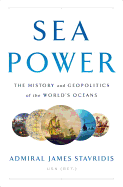
The world's interconnected seas come into sharp and illuminating focus in retired U.S. Navy Adm. James Stavridis's Sea Power: The History and Geopolitics of the World's Oceans.
Stavridis (The Accidental Admiral) spent more than 35 years in the Navy, including a stint as commander of NATO. In Sea Power, he combines personal recollections of sailing--lyrical in their treatment of ancient ports and the open ocean--with comprehensive analysis of the world's major bodies of water, their role in history, especially in trade and conflict, and present-day geopolitical challenges. Of note are excellent chapters on the Arctic Ocean and the South China Sea. The former has the potential to host a new Cold War, Stavridis demonstrates, as northern nations vie for rich natural resources under thawing ice sheets; the latter has become a flashpoint for Chinese Navy aggression against its neighbors. Stavridis navigates these bodies of water, figuratively and literally, with an eye toward peace and stability.
Though he sometimes romanticizes U.S. military dominance--once referring to the 1950s as a simpler time--Stavridis grasps the limitations of military intervention. Among other things, he criticizes Donald Trump's anti-trade, xenophobic rhetoric; highlights the increasing importance of "soft power" (the military's humanitarian and disaster relief missions); and calls for greater cooperation among nations in protecting the world's oceans and fisheries from the devastating effects of climate change. The chapter on the Caribbean best exemplifies these globalist values. Stavridis makes a strong emotional case for greater alignment of the Americas, a holistic approach integrating trade, environmental stewardship and security.
Complex in its understanding of history, yet forward-looking in its approach, Sea Power is essential reading for history buffs and policymakers. --Scott Neuffer, freelance journalist, poet and fiction author

